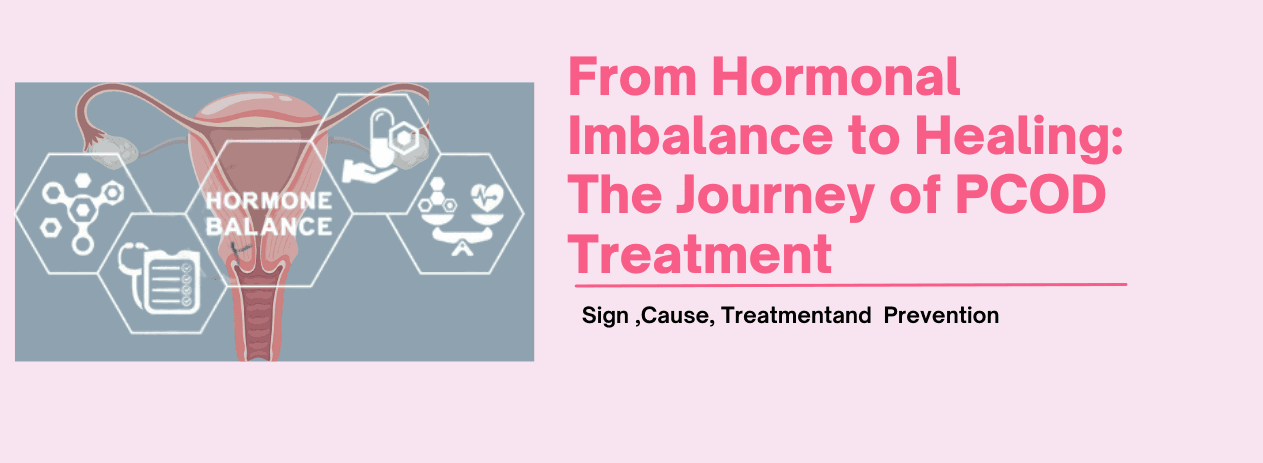| From Hormonal Imbalance to Healing: The Journey of PCOD Treatment

The World Health Organization reports that 6–13% of women in their reproductive years have PCOS, and up to 70% of impacted women go misdiagnosed globally. So, are you having issues with PCOD? You're not by yourself. Approximately one out of five Indian women, or approximately 20% of all women, are thought to have PCOD.
PCOD: What is it?
When a woman is of reproductive age, her ovaries produce many immature or partly developed eggs, a condition known as polycystic ovarian disease (PCOD). Over time, these eggs grow into ovarian cysts. Cysts cause the ovaries to enlarge and release a lot of androgen, a male hormone, which leads to infertility, irregular periods, unintended weight gain, and other health concerns.
Which Issues Can PCOD Cause?
In females, the ovaries generate the female sex hormones progesterone, estrogen, and a few male sex hormones known as androgens. During the menstrual cycle, these hormones aid in the ovaries' increased production of eggs. PCOS is caused by these sex hormones being out of balance. A woman with PCOS has a barrier to ovulation because her ovaries generate more
androgens than normal. In menstrual cycles, ovaries release one or two eggs from the follicles. The eggs in the follicles do not degenerate and remain inactive in the ovaries. Consequently, the ovaries develop cysts from these immature eggs, which result in excruciating pain and other associated symptoms. PCOD is a genetically inherited condition, which is inherited by around 40% of women from either their mother or sister.
What signs of PCOD are present?
Among the most typical symptoms are:
● Unusual increase in weight
● Most women either miscarry or do not become pregnant.
● Unusual and darker facial, back, belly, and chest hair development
● Acne vulgaris is the name for the production of acne that results in pus cells on the face.
● Menstrual difficulties or an irregular menstrual cycle. Typically, women with PCOS only receive nine periods annually. Additionally, there will be excessive bleeding and a longer-than-normal menstrual cycle. Some women might not even have
menstruation.
Causes Of PCOD
It's still unknown what exactly causes PCOD. Both hereditary and environmental factors may contribute to PCOD, according to medical professionals. PCOD is typically connected with –
● A Poor diet
● A life that is sedentary
● Pollution
● Drugs that change hormones
● Several OTC (over-the-counter) drugs and supplements Many times, PCOD is a hereditary condition that runs in families. Researchers identify several physiological factors that might raise your risk of PCOD/PCOS, including.
● Excessive Insulin Production: Insulin is a natural hormone produced by the pancreas. It aids in controlling the body's metabolic processes and blood sugar levels. Physicians think that one of the main causes of PCOS is a high insulin level.
Additionally, too much insulin causes the body to produce more androgen, or male hormone, which prevents ovulation.
● Inflammation: The body may experience low-grade inflammation for several physiological reasons. For example, the body's tissues may become inflamed as a result of mild autoimmune disorders. Consequently, the body's androgen levels rise once more.
● High Androgen Levels: This male hormone is linked to a higher risk of cardiovascular illnesses, acne, and skin problems, as well as an increase in body and facial hair.
How is a PCOD diagnosed?
Finding a diagnosis is essential to solving PCOD issues. First, your Doctor will examine you physically and ask about your medical history. The physician could then suggest testing like
- Blood tests (to measure insulin, cholesterol, blood sugar, and hormone levels)
- Pelvic ultrasonography (to measure the uterine lining and check for ovarian cysts)
What are Conventional PCOD Treatment Options?
It's crucial to keep in mind that treating Polycystic Ovarian Disease (PCOD) requires both medicine and lifestyle modifications. Although there isn't a proven treatment for the illness, controlling its symptoms can help people live better lives.
● Dietary changes might help manage symptoms and provide remedies for PCOD issues. Even a 5% drop in body weight can significantly reduce symptoms. Avoiding sugar and fatty meals may also prevent diabetes, high cholesterol, and cardiovascular problems.
● A regular exercise regimen must be planned and followed by women who lead sedentary lifestyles as part of the PCOD treatment.
● Ovulation induction drugs and cyclic hormonal therapy can improve menstrual cycle regulation.
● Acne and skin discoloration can be lessened with skin therapy.
● Infertility treatment can aid in conception.
● Androgen-producing tissue can be destroyed using laparoscopic surgery.
● Future PCOD issues can be avoided with routine health and hormone monitoring.
How Homeopathic Medicine Can be the Reliable Option for PCOD
The wonderful thing about homeopathy is that it has no negative side effects and can help permanently curePCOS.Homeopathy can be used to treat PCOS symptoms such as acne, weight gain, and undesirable hair growth. It can also be used to control menstruation and fertility. The fact that homeopathic treatments accomplish so much more than only relieving pain and suffering is simply astounding. Additionally, they may be able to treat ovarian cysts, which would lessen the need for invasive surgery. Furthermore, the application of homeopathy aids in enhancing patients' quality of life, reducing stress, and improving all aspects of their health.
An Innovative Homeopathic Treatment for PCOD by Pinaakin
Homeopathic Clinic
- Managing Hormonal Disproportion Naturally
- Enhancing the Regularity of the Menstrual Cycle
- Improving Reproductive Health and Fertility
- Reducing Weight Gain and Insulin Resistance
- Resolving PCOD Symptoms Associated with Skin and Hair
In conclusion
The goals of Pinaakin Homeopathic Clinic's natural and efficient PCOD homeopathic treatment include hormone balance, reproductive health, and long-term well-being. Women can find treatment for PCOD with safe homeopathic medicine under the skilled supervision of a licensed homeopathic physician. Women can reclaim their health and well-being by successfully managing PCOD with the combination of homeopathy and lifestyle modifications.
